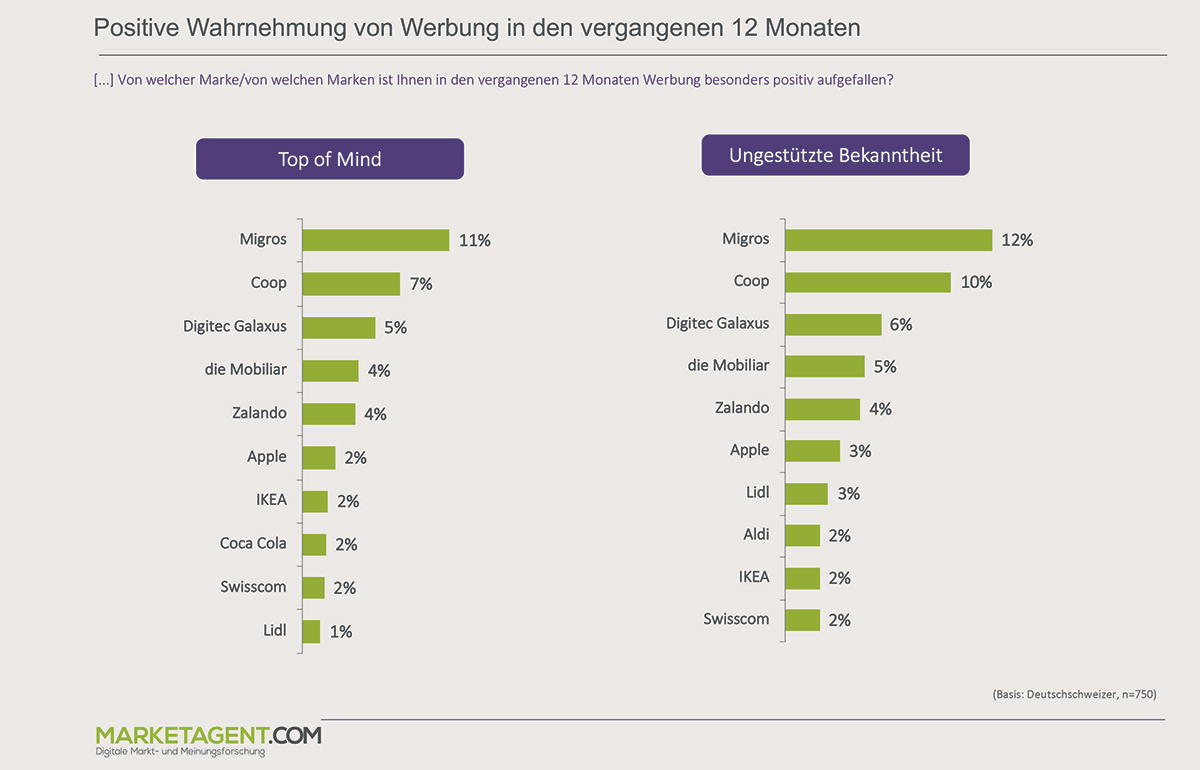Which advertising was liked in 2019 - and which was not
At the end of the year, Werbewoche, in collaboration with the market research company Marketagent.com, tested which advertisements made a positive impression - and which did not. The two most active advertisers, Migros and Coop, did well.

The company Marketagent.com, with which Werbewoche has been testing how campaigns are received by consumers for years as part of its Impact Check, conducted a representative survey to find out how advertising is perceived by German-speaking Swiss. The simple question: "From which brand or brands did you notice advertising particularly positively in the last twelve months? And which ones negatively?"
The results are divided into "top of mind" and "unaided awareness". The former group shows what first came to the respondents' minds. The unaided awareness shows the total of all mentions - i.e. also the brands that were only noted down gradually in the case of multiple mentions.
750 web-active people from German-speaking Switzerland were surveyed via online interviews in mid-November.
Of grillitarians and shopkeepers: Migros' advertising catches people's attention in a positive way.
According to Media Focus, the two retail giants are also the biggest advertisers in Switzerland. In 2019, Coop caused a sensation and a stir with its image campaign implemented by TBWA\Zürich. The launch spot enraged the teachers' association, as it depicted the kindergarten teacher on the school tripli as clumsy and out of touch with reality. The media echo was great, but the sympathies of the population were on the side of Coop and the campaign. The retailer was also able to convince with the barbecue campaign around "Darko" and "Grillschmöcker Armin" this year.

The top 50 advertisers in Switzerland, time period January to October 2019 (source: Media Focus Switzerland): Coop and Migros top the list by a wide margin.
Advertising for almost any(s)
The Marketagent.com survey confirms what can also be observed, for example, in the comment columns of video and news portals: The Digitec and Galaxus campaigns enjoy great popularity among the population and seem to stand out positively from the crowd. Both Galaxus' humorous advertising parodies, created in collaboration with the Zurich-based film production company Plan B, and Digitec's completely internally created campaigns featuring whimsical customer reviews of its own product range continued to provide amusement in 2019.
Honest customer opinions and advertising parodies: Digitec Galaxus makes advertising that hits home.
Dear Furniture ...
Speaking of popularity, the same can be said of the long-running "Dear Mobiliar" campaign. Launched in 1998 under the creative direction of Jean Etienne Aebi at Publicis, the curious claims are still providing laughs more than 20 years later. In 2019, Jung von Matt/Limmat took over the Mobiliar account from the Wirz agency, which had held it for almost two decades.
Jung von Matt continued the umbrella campaign with a spot in which a misguided smart speaker blows up a garden party, launched animated damage sketches for the Schwingfest, among other things, and put the focus on the surplus fund with near misses.
In comparison with most of the advertisers mentioned, Mobiliar generates relatively little advertising pressure and only appears in 47th place in the Media Focus ranking. The many years of continuity and concept loyalty at a high level are paying off here - Mobiliar is anchored in people's minds in connection with positive advertising.
Dear Mobiliar: The insurance company's advertising has enjoyed a good reputation among the population for years.
Zalando tops the annoyance list
And the upsets? Compared to the positive examples, the case seems far less clear-cut in the negative area. The respondents were most likely to agree on Zalando: The leading fashion online retailer in the German-speaking world "scores" the highest negative rating of 4 percent in both Top of Mind and unaided awareness. And is thus the only company for which the negative and positive mentions balance each other out.
Coop, Digitec Galaxus and Migros stand out with their advertising presence and - despite many sympathizers - by no means please everyone.
In the one-percent range, "exotics" stand out, mentioned only in a negative context. Haribo apparently didn't make all adults happy after all with the commercial in which business people speak with the voices of children.
At UPC, Salt and Zurich Insurance, too, one percent of respondents rated the advertising as negative. As with all mentions - both positive and negative - the same applies here: The extent to which this assessment is influenced by the general attitude of respondents toward the aforementioned
The question of whether this is influenced by the company remains open. For example, in a representative survey conducted by the comparison portal Moneyland in 2019, UPC and Salt in particular scored significantly lower in terms of customer satisfaction than their competitors Swisscom and Sunrise.


Finn effect lingers
The most positively perceived - and with a considerable gap to Coop in Top of Mind - was Migros. It seems reasonable to assume that the now "buried" Wirz Christmas elf Finn, who enjoyed great popularity among the population, may have played a considerable part in this.
The image campaign implemented by Publicis, which turns all customers into proud co-owners, is also likely to have contributed to awareness, as does the annual barbecue campaign by Jung von Matt/Limmat. In addition, campaigns by Wunderman Thompson, among others, were on display. Migros leaves its main competitor Coop behind, but only just in terms of unaided awareness.








